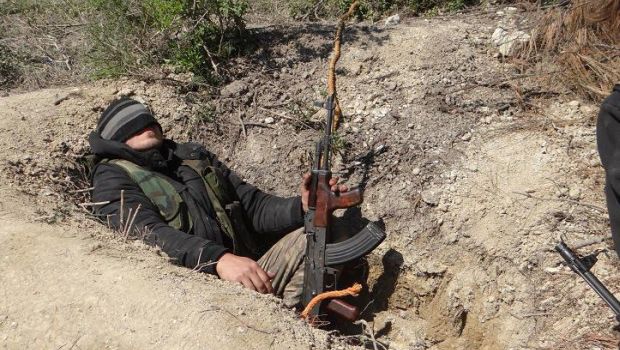
A rebel fighter rests after taking the village of Kasab and the border crossing with Turkey, in the northwestern province of Latakia, on March 23, 2014 (AFP PHOTO/AMR RADWAN AL-HOMSI)
Video footage showed six fighters holding the black banner of the Ansar Al-Sham brigade on a rocky beach, a symbolic rebel victory in the coastal province of Latakia that has been an Assad stronghold throughout three years of conflict.
“This is the first area of coast in Syria to be liberated,” said an activist who used the name Abu Bakr, referring to the beach and nearby village of Samra.
Latakia and neighboring Tartous provinces together form the Mediterranean heartland of Assad’s minority Alawite faith and have remained loyal to him as he battles mainly Sunni Muslim rebels in a civil war which has killed more than 140,000 people.
After months of setbacks in central Syria, Islamist rebels launched an offensive on Friday into the Latakia region, taking the border crossing and the Armenian Christian village of Kasab.
Since then, Assad has sent army and militia reinforcements, backed by air power, to repulse the rebels, leading to heavy fighting across the strip of territory along the Turkish border.
The Syrian Observatory for Human Rights said 14 pro-Assad fighters and six rebels—mostly foreign jihadists—were killed on Tuesday fighting for a strategic hilltop close to Kasab. Seventy-five wounded rebels were taken for treatment in Turkey.
The ferocity of the fighting highlights the significance which Assad – one of whose cousins, Hilal, a militia commander, was killed near Kasab on Sunday—attaches to repelling the rebel thrust.
Assad has lost control of much of the east and north of the country but his army, backed by Shi’ite fighters from Iraq and Lebanon’s Hezbollah, has cleared rebels out of large areas around Damascus and near the Lebanese border.
As a result the president has secured greater control over the center of Syria and choked off rebel supply routes from Lebanon, whose Sunni population supports Assad’s foes.
In the rebel-held north and east, rival Islamist groups have been fighting each other for months, dimming any hopes of toppling Assad, and the uncompromisingly hardline rule of the Islamists has alienated many inhabitants.
The Islamist fighters who took over the Christian town of Kasab have tried to show themselves in a different light, releasing videos of fighters protecting a church and reassuring the few elderly residents who had not fled the fighting.
The border crossing at Kasab they seized had been the last point of entry from Turkey into territory fully under control of Assad’s forces, since most of the northern border region is already under rebel control.
About 300 miles (480 km) to the east at the Qamishli border crossing, the United Nations said on Tuesday it had completed a five-day mission to move humanitarian aid into Syria.
Qamishli is in the furthest northeast region of Syria, where Assad’s security forces still have a presence but local Kurds have been exercising greater autonomy since the start of the uprising against four decades of Assad family rule.
Jens Laerke, a spokesman for the UN Office for the Coordination of Humanitarian Affairs, said the last dozen trucks of a 78-truck convoy crossed at Qamishli, bringing food, blankets, mattresses and medical supplies.
The United Nations says it is trying to assist nine million people inside Syria who need aid as well as 2.6 million refugees who need help in neighboring countries, but not everyone is getting the help required.
In Lebanon’s northern city of Tripoli, a 45-year-old Syrian woman set herself on fire outside a UN office in protest that she was not receiving support, according to medical sources at the hospital where she was taken for treatment.
